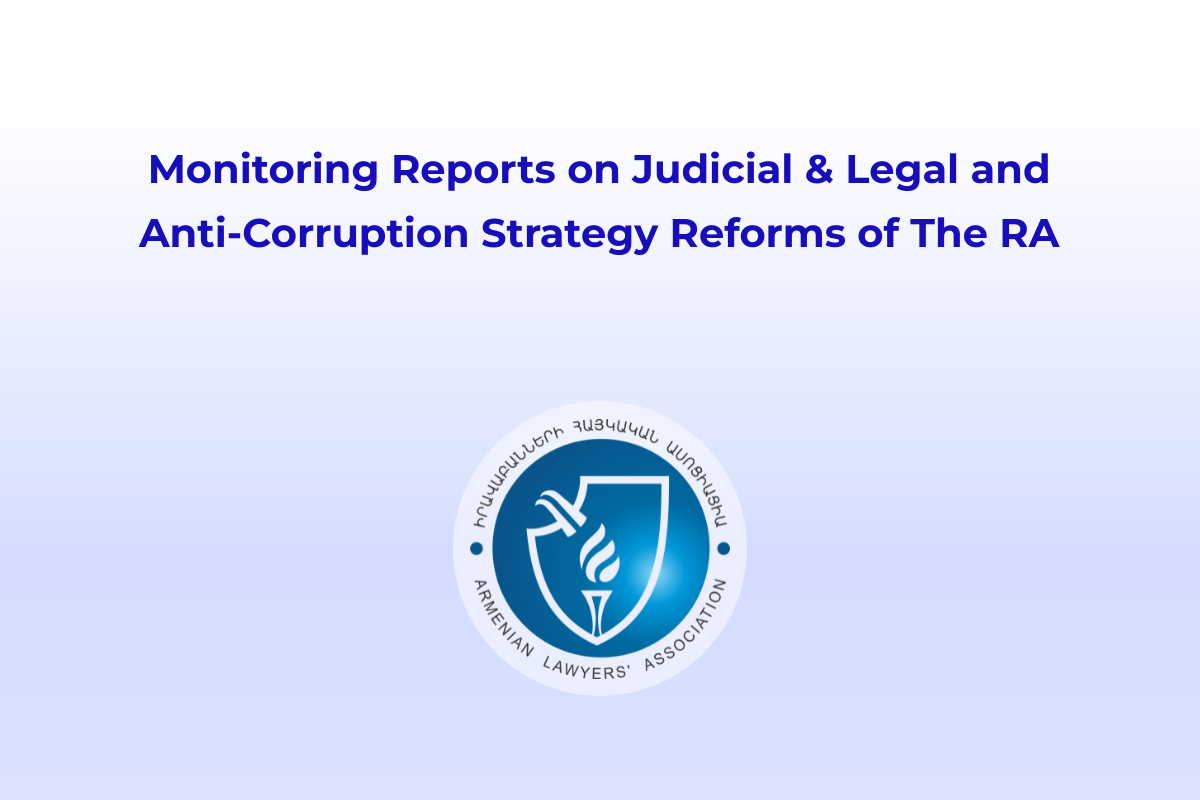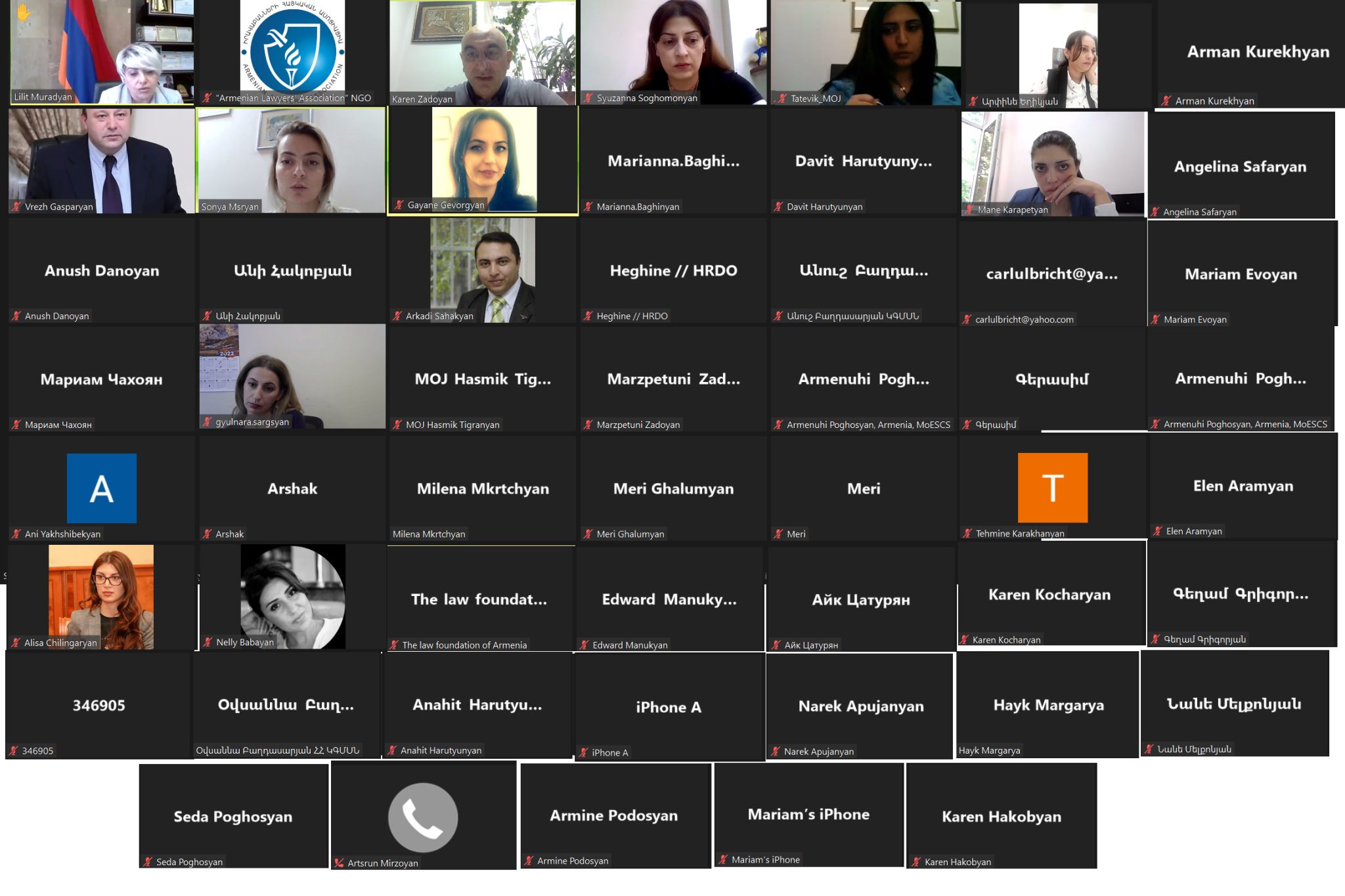
On 14 June, the presentation of alternative public monitoring reports on the implementation of Judicial, Legal and Anti-Corruption Reform strategies developed by the Armenian Lawyers’ Association in a participatory manner took place.
About 50 representatives from government agencies, civil society organizations, lawyers, advocates, and others attended the event.
In his opening speech, Mr. Karen Zadoyan, President of the Armenian Lawyers’ Association, referred to the results of the two reports and the issues raised.
“At the present stage, independent professional civil society organizations have one major task – to oversee the process of the reforms that the government carries out in anti-corruption, judicial and legal, human rights protection, police and other sectors, rather than initiate new systemic reforms. And the relationship between professional civil society organizations and the government should be built on this guideline. Independent professional civil society organizations should publicly oversee the strategies and process of reform in the above areas, identify gaps, problems, corruption risks and, in the form of professional recommendations for improving those strategies, submit them to the executive, legislative and judicial authorities.
According to Karen Zadoyan, the government should show a professional approach and understanding on behalf of its sectoral bodies in order to cooperate with independent civil society organizations exercising public control in the above-mentioned spheres, to take into account suggestions and recommendations and use them to improve sectoral strategies.
” Authorities in the field of justice should refrain from building only ostentatious, ineffective relations with their own civil society organizations, and switch to effective horizontal relations with independent civil society organizations, which will bring positive changes in the life of every citizen in the field of justice,” he said.
Ms Syuzanna Soghomonyan, Expert on Judicial and Anti-Corruption issues, noted that in general, 103 actions and sub-actions were calculated according to the action plans deriving from the judicial strategy, of which only 32% were performed within the deadline.
“More than half of the actions, 56%, were not performed, and about 10% were performed with a certain or significant violation of the deadline. The legal analysis of some of the actions, as well as the failure to completely implement the actions, suggests that the goals set by the Strategy have not been achieved, in particular the independence and impartiality of the judiciary have not been strengthened, the structures of public accountability of the judiciary have not been significantly improved, and the legislative reforms were not implemented in the envisaged volumes and content,” she said.
According to the expert, out of 46 actions envisaged by the Anti-Corruption Strategy Action Plan and to be implemented in 2021, 19 (41%) were implemented, 19 (41%) were partially implemented, and the remaining 8 actions were either not implemented at all or progress that had been made, was not enough to assess the performance of the action as “partial” (18%).
“In general, the performance of the action plan envisaged by the Strategy can be assessed as “average”, taking into account that the share of completely implemented actions is less than 50%, and the share of partially implemented actions is close to 50%,” Syuzanna Soghomonyan said.
“The main problem during the monitoring of the implementation of Strategies was the inaccessibility and scope of the strategy and action plans in terms of scope and structure,” Sociologist Ms Sonya Msryan mentioned. According to her, there were also actions that were either similar or duplicated, which could create difficulties during the implementation of the action plan or cause certain contradictions. “It is recommended to simplify the structure of such plans when developing a similar action plan as much as possible grouping similar actions, and excluding duplication of actions,”Sonya Msryan said.
At the end of the event, Karen Zadoyan, President of the ALA, noted that at this crucial stage for Armenia, the strategies should be implemented not at the urging of international organizations, with the expectation of receiving certain financial means, but they should become a real guideline of reforms and vision, which will bring positive changes in citizens’ lives.

——————————
- Alternative Public Monitoring Report on the Implementation of the 2019-2023 Strategy for Judicial and Legal Reforms of the RA: https://armla.am/en/7339.html
- Alternative Public Monitoring Report on the Implementation of the RA Anti-Corruption Strategy and its Implementation Action Plan for 2019-2022:՝ https://armla.am/en/7379.html
